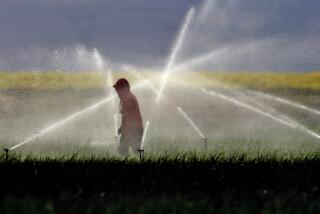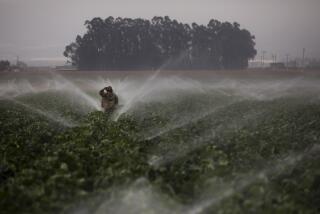Preschoolers Face ‘Intolerable Risk’ From Pesticides, Group Says
At least 3 million preschool children around the nation face an “intolerable risk” of cancer from the residues of eight pesticides found on fruits and vegetables, according to a two-year study released Monday by a leading environmental group.
One California legislator immediately called on the state to begin monitoring pesticide levels in processed food and threatened to sponsor a ballot initiative in 1990 if the Legislature does not enact a food testing program.
The study by the Natural Resources Defense Council charges that federal and state regulations do not provide adequate protection for preschool-aged children, who generally consume a higher proportion of fruits and vegetables than adults at an age when they are particularly susceptible to cancer-causing chemicals.
“Our nation’s children are being harmed by the very fruits and vegetables we tell them will make them grow up healthy and strong,” the report concluded. “Current regulation of pesticides fails to protect the preschooler.”
Children are at higher risk from pesticides than adults because they consume a higher ratio of fruits and vegetables for their body weight--a fact not taken into account when setting federal safety levels for individual pesticides. Preschoolers also actually consume significantly higher amounts of certain fruits and vegetables, such as apple juice and applesauce, according to the report, which basically involved analysis of existing government data on food consumption and pesticide residues.
In Washington, representatives of the Natural Resources Defense Council threatened to file a lawsuit within a week unless the Environmental Protection Agency agrees to revise its regulations governing the use of some 300 pesticides. The council already has sued the EPA in an effort to force a ban on the use of daminozide, the most dangerous of the chemicals studied, and has appealed to the U.S. Supreme Court after losing in the lower courts on a jurisdictional issue.
Federal and state officials as well as California agricultural groups strongly defended the safety of the food supply, contending that existing laws provide sufficient protection for all consumers.
In a statement issued even before the council report was officially released, EPA acting deputy administrator John Moore said flatly: “Food containing legal levels of pesticide residues is safe for people of all ages. In fact, the food supply of the United States is among the safest in the world.”
According to the council study titled, “Intolerable Risk: Pesticides in Our Children’s Food,” between 5,500 and 6,200 children under 6 may get cancer sometime in their lives because of their exposure at this age to the eight pesticides identified in the study.
For children who consume large amounts of apple juice and applesauce, daminozide, also sold under the name Alar, can cause one additional case of cancer for every 1,100 children--a level 910 times the accepted federal safety standard, the study said.
However Jim Wells, a spokesman for the California Department of Food and Agriculture, countered that the study’s figures were “just irresponsible fear-mongering.” He said an analysis of daminozide conducted by the state indicates that the risk of cancer is less than two in 10 million--well above the federal safety threshold of one in 1 million.
Lawrie Mott, a scientist with the Natural Resources Defense Council, called on parents concerned about pesticide residues in their children’s food to urge state and federal officials to step up monitoring and quickly ban products found to be hazardous.
Mott cautioned that avoiding one particular food, such as apples, would not provide adequate protection since pesticide residues are found in a wide range of fruits and vegetables, including strawberries, cherries, grapes, cantaloupes, tomatoes, carrots, oranges, grapefruits and broccoli.
To reduce exposure to pesticides, she recommended that consumers buy locally grown produce that is in season, consider purchasing organically grown food, avoid imported produce and wash fruits and vegetables carefully before eating them.
“The purpose of the report is not to scare parents into deciding not to feed their children fruits and vegetables,” she said. “We think parents have a right to know that not only is there a risk out there but that government programs are failing to protect them. They have a right to be outraged and to put pressure on the government to bring those reforms into reality.”
Assemblyman Lloyd G. Connelly (D-Sacramento) said he will renew his efforts to establish a state monitoring program for processed foods and dramatically increase the state’s ongoing testing of raw food.
Similar legislation was killed last year, Connelly said, because of effective lobbying by agricultural and chemical manufacturing interests. Backers of the testing measure have already begun conducting public opinion polls in preparation for launching an initiative based on the bill next year, he said.
“Nothing has been done about this so far because there are very effective advocates on the other side,” Connelly said. “Alar, in particular, we knew 19 years ago represented a significant health risk. . . . They’re tough, they’re influential and they have retarded what should have been effective policing.”
Environmentalists have criticized the EPA harshly in recent weeks for what they charge has been the agency’s deliberate “foot-dragging” in regulation of pesticides. They noted that the EPA recently delayed regulatory action on daminozide for 18 months despite a finding that the pesticide was a carcinogen. The agency also permitted some continued use of captan, another pesticide included in the NRDC study, despite a similar finding that it contributed to cancer.
Moore of the EPA, in defending the federal government’s record, said his agency already takes into account the prospect that children might be exposed to higher pesticide levels than adults.
Nevertheless, because the agency remained concerned about the prospect that children and infants might be more sensitive than adults to the effects of pesticides, it has asked the National Academy of Sciences to study that possibility, Moore said. That report is due next year.
An EPA spokesman said Monday that the agency plans to review the NRDC study, but indicated that it is unlikely to move quickly to revise its pesticide guidelines, despite the NRDC’s threatened lawsuit.
“There has to be some basis in scientific life other than this NRDC report to radically change this country’s system of pesticide regulation,” said spokesman Dave Cohen. “This would not be the first time NRDC has sued us over a difference of opinion.”
Representatives of chemical manufacturers and the food processing industry joined in endorsing the EPA’s position that its pesticide regulations offer adequate protections for public health.
“If you do a reality check on the whole thing, you just wonder how the sky could be falling when we’re living longer and cancer rates are lower than they’ve ever been,” said John McCarthy, vice president of the National Agricultural Chemical Assn. “. . . We’re not poisoning children.”
Richard C. Paddock reported from Sacramento and Douglas Jehl reported from Washington.
More to Read
Sign up for Essential California
The most important California stories and recommendations in your inbox every morning.
You may occasionally receive promotional content from the Los Angeles Times.









